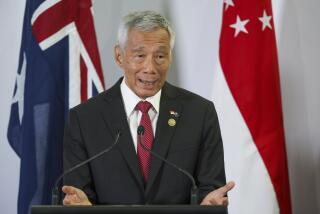DIPLOMACY : Cushy Post, Delicate Duty in Hong Kong
- Share via
HONG KONG — Christopher Patten, this colony’s 28th and perhaps last governor-designate, has tossed aside the sword, white embroidered suit and swan-plumed hat that once were considered de rigueur ceremonial gear for the incoming leader of Hong Kong’s government.
Instead, Patten arrived Thursday in a business suit to take up his five-year post, which, despite its occasional imposing dress requirements, includes some impressive perks: a $276,000 tax-free annual salary, a rent-free mansion with wall-to-wall servants, a country home with a swimming pool, a Rolls-Royce and a 100-foot yacht.
The cushy post, however, also comes with big worries over how to prepare Hong Kong for the withdrawal of Britain’s 150-year rule and for the resumption of China’s sovereignty in 1997, in accord with principles laid down in a 1984 Sino-British agreement.
In his swearing-in ceremony speech, Patten outlined the massive challenges that face the people of Hong Kong, saying: “Our task for the future is as momentous as your achievements in the past. It is a task that will require all the qualities you have already shown--resilience, determination, drive--only in still greater measure. It is a task which, when we accomplish it successfully . . . will provide a shining example to the world of partnership and cooperation between peoples and nations for the good of all.”
Patten, 48, is a former chairman of Britain’s Conservative Party and is closely associated with Prime Minister John Major. He is considered a political heavyweight and a brilliant negotiator--a skill he will need during his transitional term.
Hong Kong’s future hinges on Beijing’s adherence to a “one country, two systems” formula, which promises that the British colony can maintain its free-wheeling economic and social system for at least 50 years after 1997. China also has promised the colony a “high degree of autonomy” but not full self-rule.
But Patten’s pledge to review the pace of democratization in Hong Kong appears to have caused Beijing to flex its muscles recently. Nothing has made this more apparent than China’s decision to withhold approval of financing for a $14.4-billion airport development project.
Although Chinese Premier Li Peng and Major had ordered discussions conducted after they met at the Rio de Janeiro Earth Summit last month, high-level talks deadlocked Monday in Beijing between China and Britain over how to pay for the airport, which the two nations had agreed last year would be built on one of Hong Kong’s outlying islands.
“The airport symbolizes everything. It is a classic case of where nothing can go ahead unless China gives the go-ahead,” said Robert Broadfoot, managing director of Political & Economic Risk Consultancy Ltd.
Some people in Hong Kong believe that Beijing is using the airport issue as a bargaining chip to influence other affairs in the colony before the transition; China, on the other hand, has expressed concern that the project will raid Hong Kong’s resources, rewarding British contractors in the process.
“Major and the British government have to convince the Chinese that Patten is someone they can negotiate with because there are all sorts of issues that are building up,” Broadfoot said. “You can’t have Major running to Beijing every time to break the logjam.”
But Patten’s political reputation may well land him in hot water more often than his predecessor, Lord Wilson, a diplomat who chose his words very carefully and was never in danger of being accused of shooting from the hip.
China warned the new governor last month against making major political changes in Hong Kong.
“Mr. Patten is coming here as a very high-ranking civil servant,” said Liu Yiu-chu, a local lawyer and delegate to the Chinese National People’s Congress. “If he does not act honorably and fails to implement the (Sino-British agreement on Hong Kong), he is going to find himself in very deep waters. There is absolutely no room for a politician in his job.”
Hong Kong’s conservative camp, which includes pro-business and pro-China forces, does not want politics to interfere with the thriving economic relationship between the colony and southern China.
On the other hand, Hong Kong’s liberal camp of directly elected lawmakers wants Britain to implement democratic reforms before 1997 to safeguard the local populace with the right to self-determination.
“But in Hong Kong, people are not independent citizens of an independent country. . . . The United Kingdom promised to restore Hong Kong to China, not to let Hong Kong go the independence way,” Liu said.
More to Read
Sign up for Essential California
The most important California stories and recommendations in your inbox every morning.
You may occasionally receive promotional content from the Los Angeles Times.













